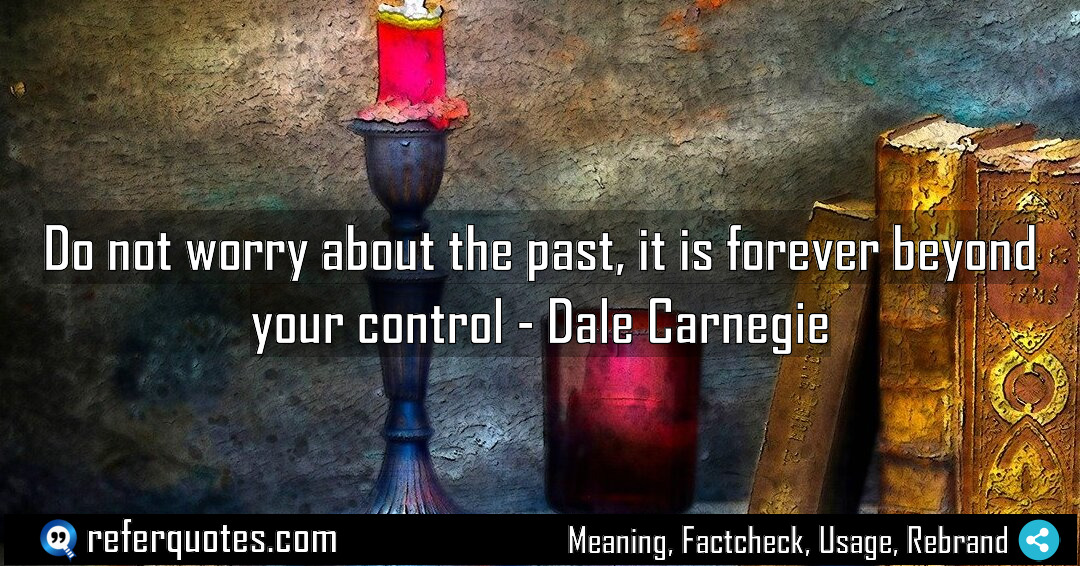Do not worry about the past… it’s a simple but profound reminder that our energy is best spent on what we can actually change, not what’s already written in stone.
Share Image Quote:Table of Contents
Meaning
The core message is brutal but liberating: the past is a locked room. You can’t get back in. Obsessing over it is a form of self-torture that drains the energy you need for today.
Explanation
Look, I’ve seen so many people, brilliant people, get completely paralyzed by this. They’re replaying a conversation from last week, a business decision from last year, a mistake from a decade ago. And here’s the thing I’ve learned—it’s not about the event itself. It’s about the story we attach to it. That story becomes a weight. Carnegie isn’t saying the past doesn’t matter; he’s saying that worrying about it is a useless expenditure of your most precious asset: your present mental focus. It’s the difference between learning from a mistake and being haunted by it. One moves you forward. The other keeps you stuck.
Quote Summary
| Context | Attributes |
|---|---|
| Original Language | English (4111) |
| Category | Wisdom (465) |
| Topics | control (63), past (7) |
| Literary Style | didactic (393) |
| Emotion / Mood | lively (108) |
| Overall Quote Score | 59 (46) |
Origin & Factcheck
This is correctly attributed to Dale Carnegie’s mega-hit, How to Stop Worrying and Start Living, which was published in the United States in 1948. You’ll sometimes see similar sentiments floating around misattributed to Stoic philosophers like Seneca, and while the philosophy is similar, this specific, direct phrasing is pure Carnegie.
Quote Summary
| Context | Attributes |
|---|---|
| Original Language | English (4111) |
| Category | Wisdom (465) |
| Topics | control (63), past (7) |
| Literary Style | didactic (393) |
| Emotion / Mood | lively (108) |
| Overall Quote Score | 59 (46) |
Context
In the book, this idea isn’t just a one-off line. It’s part of a core principle Carnegie hammers home: Live in “day-tight compartments.” He uses the analogy of a ship’s watertight bulkheads, sealing off the past—the yesterdays—so they can’t flood and sink the ship today. This quote is the practical application of that seal.
Usage Examples
So how do you actually use this? It’s a mental switch. When you catch yourself ruminating, you literally ask: “Can I change this? Right now?” If the answer is no, you consciously redirect.
- For a leader whose team failed a project: Instead of hosting a blame session about what went wrong, focus the team’s energy on “What’s one thing we learned that we apply to the next project?”
- For anyone after a personal conflict: Replaying the argument won’t change it. But deciding on a constructive next step—an apology, a boundary, or simply letting it go—is an action you can take.
- For an entrepreneur who launched a product that flopped: The flop is in the past. The market research, the customer feedback, the lessons learned? That’s the raw material for the next launch, and that’s where your focus should be.
To whom it appeals?
| Context | Attributes |
|---|---|
| Theme | Advice (756) |
| Audiences | athletes (299), caregivers (38), executives (153), students (3486) |
| Usage Context/Scenario | caregiver support (1), exam anxiety guides (1), leadership coaching (147), post game debriefs (1) |
Share This Quote Image & Motivate
Common Questions
Question: But isn’t learning from the past important?
Answer: Absolutely. But there’s a massive difference between learning and worrying. Learning is a quick, focused extraction of a lesson. Worrying is an endless, emotional loop that produces nothing but anxiety. Learn the lesson, then close the book.
Question: What about past trauma? This seems too simplistic for that.
Answer: You’re right, it is. This quote is a powerful tool for daily worries and regrets, not a substitute for professional help in processing deep trauma. For those heavier things, the principle might be “the past is beyond your sole control,” and seeking help is the proactive step to take back some of that control.
Question: How is this different from just avoiding your problems?
Answer: Great question. Avoidance is passive and fearful—you’re pretending the problem doesn’t exist. Accepting that the past is beyond your control is an active decision. It’s a strategic choice to stop fighting a battle you cannot win and to marshal your resources for the battles you can.
Similar Quotes
Your past does not equal your future Meaning Factcheck Usage>>
Your past does not equal your future is a powerful reminder that you’re not defined by your history. It’s about breaking free from old stories and creating your destiny from…
You cannot find yourself by going into the Meaning Factcheck Usage>>
You cannot find yourself by going into the past… because that’s not where you exist. Tolle argues that true self-discovery happens right here, in the messy, beautiful, and often overlooked…
When you cannot go back you have to Meaning Factcheck Usage>>
When you cannot go back, you have to worry only… It’s a powerful call to stop dwelling on the past and focus your energy on the path ahead. Table of…
Love doesn t erase the past but it Meaning Factcheck Usage>>
Love doesn’t erase the past, but it makes the future… that’s the powerful core of Gary Chapman’s insight. It’s a game-changer for anyone who thinks love is a magic wand…
You will regret only the things you did Meaning Factcheck Usage>>
You will regret only the things you did not do… it’s a powerful idea, isn’t it? It flips the script on how we usually think about risk and regret. Let’s…
